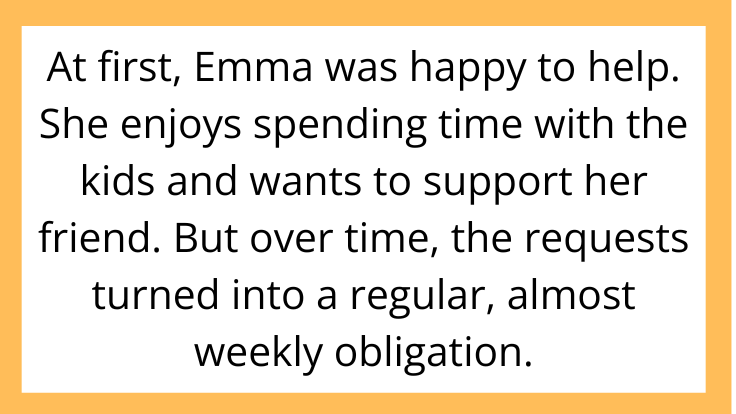AITAH for Refusing to Babysit My Friend’s Kids Every Weekend?
Friendships are built on support, trust, and mutual respect—but what happens when one friend feels taken advantage of? Today’s AITAH scenario dives into a common dilemma: when does helping become too much, and is saying “no” really selfish?
Let’s explore this story and find out who might be in the wrong.
The Backstory: When “Helping Out” Becomes a Weekly Expectation

The original poster, Emma, a 32-year-old marketing professional, shared her frustration on Reddit’s r/AITAH community. Emma has been close friends with Lisa for over 10 years. Recently, Lisa has been asking Emma to babysit her two young children almost every weekend.
At first, Emma was happy to help. She enjoys spending time with the kids and wants to support her friend. But over time, the requests turned into a regular, almost weekly obligation.
Emma says she feels exhausted and overwhelmed, especially because she has a demanding job and her own personal commitments. She also mentions that Lisa rarely offers to return the favor or compensate her time.
The Conflict: Emma Says “No,” Lisa Gets Upset

Emma decided to set a boundary and told Lisa she couldn’t babysit every weekend anymore. She explained that while she loves the kids, she needs time to recharge and focus on her own life.
Lisa’s reaction was less understanding than Emma expected. She accused Emma of being selfish and not valuing their friendship. Lisa said, “I thought friends help each other out—why can’t you just make an exception?”
Emma felt hurt and turned to Reddit for an outside perspective: AITAH for refusing to babysit every weekend?
Community Verdict: Boundaries Are Healthy, Not Selfish

Most commenters sided with Emma, emphasizing the importance of personal boundaries and self-care.
Why Emma Is Not the Villain
-
Sustainable Support: Helping a friend doesn’t mean sacrificing your own well-being.
-
Clear Communication: Emma was honest about her limits rather than quietly resenting Lisa.
-
Mutual Respect: Friendships should be balanced; one-sided obligations breed resentment.
One commenter summarized it well:
“You’re allowed to say no. Real friends respect that and don’t guilt trip you.”
Understanding Lisa’s Perspective

Some users empathized with Lisa’s situation. Raising young children can be stressful, and finding reliable childcare on short notice is tough. Lisa may feel desperate for help and interpret Emma’s refusal as rejection.
However, desperation doesn’t justify disregarding a friend’s boundaries or expecting unlimited availability.
Why Setting Boundaries Matters in Friendships

Healthy friendships thrive when both people feel valued and respected. Setting limits on favors like babysitting is not selfish—it’s necessary for balance.
Without boundaries, one friend may feel drained and taken for granted, while the other might unknowingly overstep.
Tips for Navigating Similar Situations

-
Be Honest Early: Communicate your availability and limits clearly.
-
Offer Alternatives: Suggest other solutions like shared childcare, rotating help, or professional babysitters.
-
Check In Regularly: Maintain open dialogue about feelings to avoid resentment.
-
Recognize When to Step Back: If a friend repeatedly disrespects your boundaries, reassess the relationship.
Final Thoughts: You Can Care Without Overcommitting

Emma’s story is a reminder that saying no doesn’t make you a bad friend—it makes you a human with needs.
Supporting loved ones is important, but not at the expense of your health or happiness.



